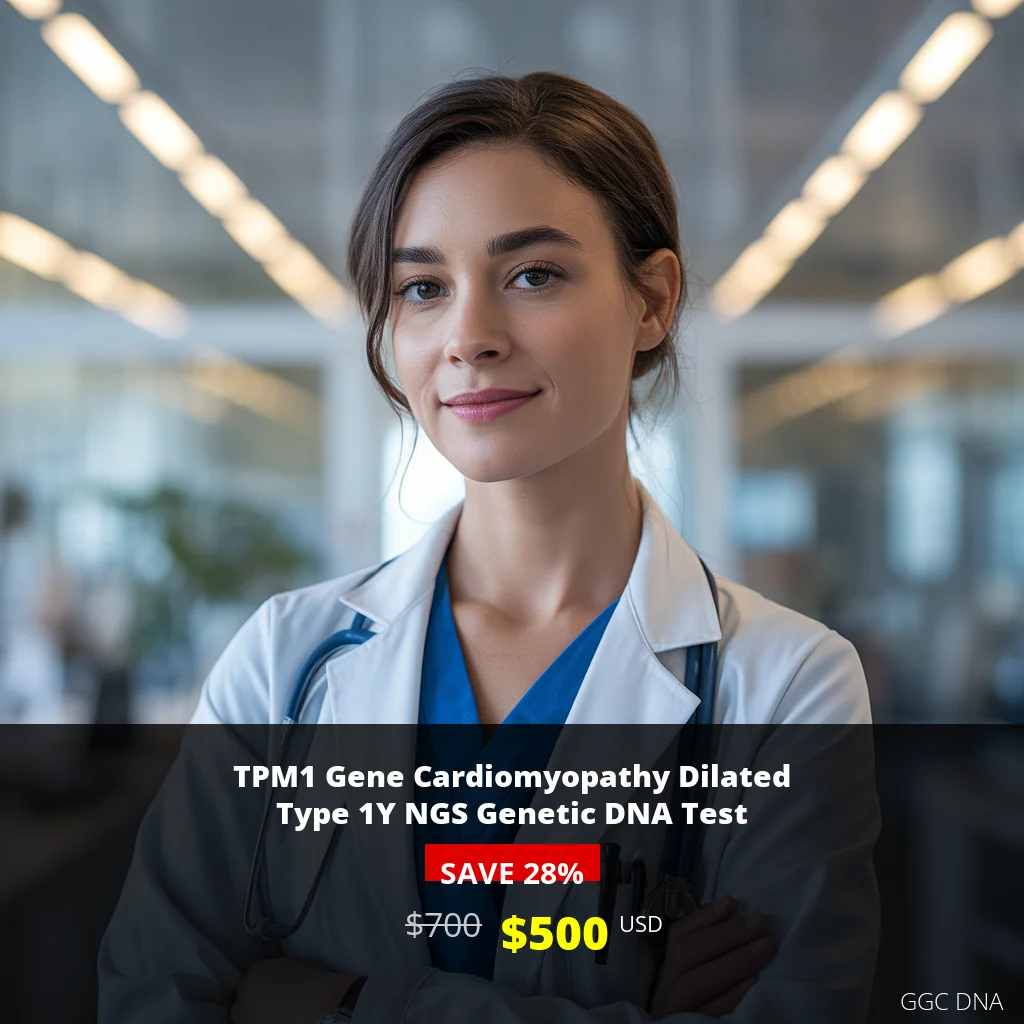TPM1 Gene Cardiomyopathy Dilated Type 1Y NGS Genetic DNA Test
Comprehensive Introduction to TPM1 Genetic Testing
The TPM1 Gene Cardiomyopathy Dilated Type 1Y NGS Genetic DNA Test represents a breakthrough in cardiovascular genetic diagnostics, offering precise detection of inherited heart conditions that can significantly impact patient outcomes. This advanced genetic analysis focuses on the TPM1 gene, which encodes tropomyosin alpha-1 chain – a critical protein component of cardiac muscle fibers. Mutations in this gene disrupt normal heart muscle contraction and relaxation, leading to dilated cardiomyopathy type 1Y, a serious condition characterized by enlarged heart chambers and reduced pumping efficiency.
Understanding your genetic predisposition to cardiomyopathy is crucial for early intervention and personalized treatment strategies. Our state-of-the-art Next-Generation Sequencing technology provides unparalleled accuracy in detecting TPM1 gene variants, enabling healthcare providers to implement targeted management approaches before significant cardiac damage occurs.
What the Test Measures and Detects
This comprehensive genetic test specifically analyzes the TPM1 gene for pathogenic variants associated with dilated cardiomyopathy type 1Y. The test examines:
- Complete TPM1 gene sequencing using NGS technology
- Point mutations affecting tropomyosin protein structure
- Deletions and insertions that disrupt cardiac muscle function
- Genetic variants known to cause progressive heart enlargement
- Inheritance patterns for family risk assessment
The test identifies both known pathogenic variants and novel mutations that may contribute to the development of dilated cardiomyopathy, providing a complete genetic profile for informed clinical decision-making.
Who Should Consider This Test
Clinical Indications and Symptoms
This genetic test is particularly important for individuals experiencing:
- Unexplained shortness of breath or fatigue during normal activities
- Family history of cardiomyopathy or sudden cardiac death
- Abnormal echocardiogram results showing enlarged heart chambers
- Unexplained heart failure symptoms in young adults
- History of arrhythmias or palpitations without clear cause
- Progressive exercise intolerance or reduced physical capacity
- Swelling in legs, ankles, or abdomen suggesting fluid retention
- Family members diagnosed with inherited heart conditions
High-Risk Populations
Individuals with first-degree relatives affected by dilated cardiomyopathy should strongly consider genetic testing, as early detection can significantly improve outcomes through proactive management.
Significant Benefits of TPM1 Genetic Testing
Undergoing the TPM1 Gene Cardiomyopathy Dilated Type 1Y NGS Genetic DNA Test offers numerous advantages:
- Early Risk Identification: Detect genetic predisposition before symptoms develop
- Personalized Treatment Plans: Tailor medical interventions based on genetic findings
- Family Screening Guidance: Identify at-risk relatives for preventive care
- Improved Prognostic Accuracy: Better predict disease progression and outcomes
- Reproductive Planning: Make informed decisions about family planning
- Reduced Diagnostic Uncertainty: Provide definitive answers for unexplained cardiac symptoms
- Cost-Effective Prevention: Avoid expensive emergency treatments through early intervention
Understanding Your Test Results
Interpretation Guidelines
Your genetic test results will fall into one of several categories, each with specific clinical implications:
- Positive Result: Indicates the presence of a known pathogenic TPM1 variant. This confirms genetic predisposition to dilated cardiomyopathy type 1Y and requires comprehensive cardiac evaluation and ongoing monitoring.
- Negative Result: No pathogenic TPM1 variants detected. While reassuring, this doesn’t completely rule out other genetic or non-genetic causes of cardiomyopathy.
- Variant of Uncertain Significance (VUS): Identifies a genetic change with unknown clinical impact. Regular follow-up and family studies may be recommended.
- Complex Results: May require additional genetic counseling and specialized interpretation.
Next Steps After Testing
All results should be discussed with a qualified cardiologist or genetic counselor who can provide personalized recommendations based on your specific genetic findings, family history, and clinical presentation.
Test Pricing and Details
| Test Component | Details | Price (USD) |
|---|---|---|
| Test Name | TPM1 Gene Cardiomyopathy Dilated Type 1Y NGS Genetic DNA Test | – |
| Discount Price | Limited time special offer | $500 |
| Regular Price | Standard pricing | $700 |
| Turnaround Time | Comprehensive analysis period | 3-4 Weeks |
| Sample Type | Multiple collection options available | Blood, Extracted DNA, or Blood on FTA Card |
Nationwide Testing Availability
We proudly serve patients across the United States with convenient testing locations in all major metropolitan areas including New York, Los Angeles, Chicago, Houston, Phoenix, Philadelphia, San Antonio, San Diego, Dallas, San Jose, and many other cities. Our network of certified collection centers ensures accessible genetic testing services nationwide.
Pre-Test Requirements and Preparation
To ensure optimal testing outcomes, we recommend:
- Comprehensive clinical history documentation
- Genetic counseling session with our certified specialists
- Development of detailed family pedigree chart
- Review of existing cardiac evaluations and test results
- Discussion of testing implications and potential outcomes
Take Control of Your Cardiac Health Today
Don’t wait for symptoms to develop before understanding your genetic risk for dilated cardiomyopathy. Early detection through TPM1 genetic testing can provide life-saving insights and enable proactive management strategies. Our team of cardiovascular genetics specialists is ready to guide you through the testing process and help interpret your results within the context of your overall health.
Call or WhatsApp us today at +1(267) 388-9828 to schedule your genetic counseling session and book the TPM1 Gene Cardiomyopathy Dilated Type 1Y NGS Genetic DNA Test. Take the first step toward comprehensive cardiac risk assessment and personalized preventive care.







